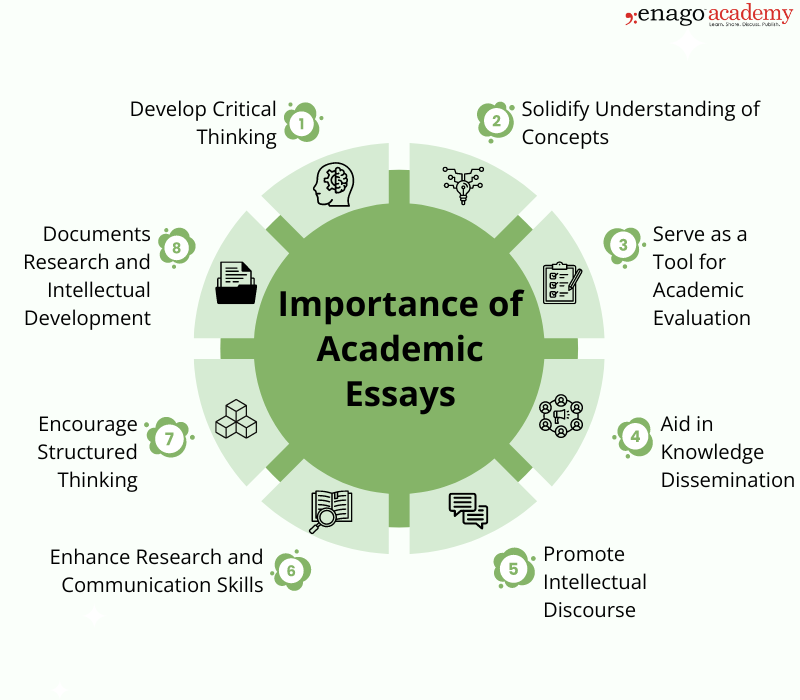Academic Essay Writing Made Simple: 4 types and tips

The pen is mightier than the sword, they say, and nowhere is this more evident than in academia. From the quick scribbles of eager students to the inquisitive thoughts of renowned scholars, academic essays depict the power of the written word. These well-crafted writings propel ideas forward and expand the existing boundaries of human intellect.
What is an Academic Essay
An academic essay is a nonfictional piece of writing that analyzes and evaluates an argument around a specific topic or research question. It serves as a medium to share the author’s views and is also used by institutions to assess the critical thinking, research skills, and writing abilities of a students and researchers.
Importance of Academic Essays
 4 Main Types of Academic Essays
4 Main Types of Academic Essays
While academic essays may vary in length, style, and purpose, they generally fall into four main categories. Despite their differences, these essay types share a common goal: to convey information, insights, and perspectives effectively.
1. Expository Essay
2. Descriptive Essay
3. Narrative Essay
4. Argumentative Essay
Expository and persuasive essays mainly deal with facts to explain ideas clearly. Narrative and descriptive essays are informal and have a creative edge. Despite their differences, these essay types share a common goal ― to convey information, insights, and perspectives effectively.
Expository Essays: Illuminating ideas
An expository essay is a type of academic writing that explains, illustrates, or clarifies a particular subject or idea. Its primary purpose is to inform the reader by presenting a comprehensive and objective analysis of a topic.
By breaking down complex topics into digestible pieces and providing relevant examples and explanations, expository essays allow writers to share their knowledge.
What are the Key Features of an Expository Essay
- Presents multiple viewpoints while maintaining objectivity
- Uses direct and concise language to ensure clarity for the reader
- Composed of a logical structure with an introduction, body paragraphs and a conclusion
- Provides factual information without bias
When is an Expository Essay Written
1. For academic assignments to evaluate the understanding of research skills.
2. As instructional content to provide step-by-step guidance for tasks or problem-solving.
3. In journalism for objective reporting in news or investigative pieces.
4. As a form of communication in the professional field to convey factual information in business or healthcare.
How to Write an Expository Essay
Expository essays are typically structured in a logical and organized manner.
1. Topic Selection and Research
- Choose a topic that can be explored objectively
- Gather relevant facts and information from credible sources
- Develop a clear thesis statement
2. Outline and Structure
- Create an outline with an introduction, body paragraphs, and conclusion
- Introduce the topic and state the thesis in the introduction
- Dedicate each body paragraph to a specific point supporting the thesis
- Use transitions to maintain a logical flow
3. Objective and Informative Writing
- Maintain an impartial and informative tone
- Avoid personal opinions or biases
- Support points with factual evidence, examples, and explanations
4. Conclusion
- Summarize the key points
- Reinforce the significance of the thesis
Descriptive Essays: Painting with words
Descriptive essays transport readers into vivid scenes, allowing them to experience the world through the writer‘s lens. These essays use rich sensory details, metaphors, and figurative language to create a vivid and immersive experience. Its primary purpose is to engage readers’ senses and imagination.
It allows writers to demonstrate their ability to observe and describe subjects with precision and creativity.
What are the Key Features of Descriptive Essay
- Demonstrates creativity and expressiveness in narration
- Includes close attention to detail, engaging the reader’s senses
- Engages the reader’s imagination and emotions through immersive storytelling using analogies, metaphors, similes, etc.
- Employs figurative language and imagery to paint a vivid picture for the reader
When is a Descriptive Essay Written
1. Personal narratives or memoirs that describe significant events, people, or places.
2. Travel writing to capture the essence of a destination or experience.
3. Character sketches in fiction writing to introduce and describe characters.
4. Poetry or literary analyses to explore the use of descriptive language and imagery.
How to Write a Descriptive Essay
The descriptive essay lacks a defined structural requirement but typically includes: an introduction introducing the subject, a thorough description, and a concluding summary with insightful reflection.
1. Subject Selection and Observation
- Choose a subject (person, place, object, or experience) to describe
- Gather sensory details and observations
2. Engaging Introduction
- Set the scene and provide the context
- Use of descriptive language and figurative techniques
3. Descriptive Body Paragraphs
- Focus on specific aspects or details of the subject
- Engage the reader’s senses with vivid imagery and descriptions
- Maintain a consistent tone and viewpoint
4. Impactful Conclusion
- Provide a final impression or insight
- Leave a lasting impact on the reader
Narrative Essays: Storytelling in Action
Narrative essays are personal accounts that tell a story, often drawing from the writer’s own experiences or observations. These essays rely on a well-structured plot, character development, and vivid descriptions to engage readers and convey a deeper meaning or lesson.
What are the Key features of Narrative Essays
- Uses an informal and expressive tone
- Presents events and characters in sequential order
- Written from a first-person perspective and hence subjective
- Based on real personal experiences
When is a Narrative Essay Written
It is commonly assigned in high school and college writing courses to assess a student’s ability to convey a meaningful message or lesson through a personal narrative. They are written in situations where a personal experience or story needs to be recounted, such as:
1. Reflective essays on significant life events or personal growth.
2. Autobiographical writing to share one’s life story or experiences.
3. Creative writing exercises to practice narrative techniques and character development.
4. College application essays to showcase personal qualities and experiences.
How to Write a Narrative Essay
Narrative essays typically follow a chronological structure, with an introduction that sets the scene, a body that develops the plot and characters, and a conclusion that provides a sense of resolution or lesson learned.
1. Experience Selection and Reflection
- Choose a significant personal experience or event
- Reflect on the impact and deeper meaning
2. Immersive Introduction
- Set the scene and provide the context
- Introduce characters and establish the tone and point of view
3. Plotline and Character Development
- Advance the plot and character development through body paragraphs
- Incorporate dialog, conflict, and resolution
- Maintain a logical and chronological flow
4. Insightful Conclusion
- Reflect on lessons learned or insights gained
- Leave the reader with a lasting impression
Argumentative Essays: Persuasion and Critical Thinking
Argumentative essays are the quintessential form of academic writing in which writers present a clear thesis and support it with well-researched evidence and logical reasoning. These essays require a deep understanding of the topic, critical analysis of multiple perspectives, and the ability to construct a compelling argument.
What are the Key Features of an Argumentative Essay?
- Critical analysis and evaluation of the issue
- Logical and well-structured arguments
- Credible and relevant evidence from reputable sources
- Consideration and refutation of counterarguments
When is an Argumentative Essay Written?
Argumentative essays are written to present a clear argument or stance on a particular issue or topic. In academic settings they are used to develop critical thinking, research, and persuasive writing skills. However, argumentative essays can also be written in various other contexts, such as:
1. Opinion pieces or editorials in newspapers, magazines, or online publications.
2. Policy proposals or position papers in government, nonprofit, or advocacy settings.
3. Persuasive speeches or debates in academic, professional, or competitive environments.
4. Marketing or advertising materials to promote a product, service, or idea.
How to write an Argumentative Essay
Argumentative essays begin with an introduction that states the thesis and provides context. The body paragraphs develop the argument with evidence, address counterarguments, and use logical reasoning. The conclusion restates the main argument and makes a final persuasive appeal.
1. Topic Selection and Research
- Choose a debatable and controversial issue
- Conduct thorough research and gather evidence and counterarguments
2. Thesis and Introduction
- Craft a clear and concise thesis statement
- Provide background information and establish importance
3. Structured Body Paragraphs
- Focus each paragraph on a specific aspect of the argument
- Support with logical reasoning, factual evidence, and refutation
- Use transitions to maintain a logical flow
4. Persuasive Techniques
- Adopt a formal and objective tone
- Use persuasive techniques (rhetorical questions, analogies, appeals)
5. Impactful Conclusion
- Summarize the main points
- Leave the reader with a strong final impression and call to action
To learn more about argumentative essay, check out this article.
5 Quick Tips for Researchers to Improve Academic Essay Writing Skills
1. Review your work multiple times for clarity, coherence, and adherence to academic guidelines to ensure a polished final product
2. Use clear and concise language to convey ideas effectively without unnecessary words
3. Use well-researched, credible sources to substantiate your arguments with data, expert opinions, and scholarly references
4. Ensure a coherent structure with effective transitions, clear topic sentences, and a logical flow to enhance readability
5. To elevate your academic essay, consider submitting your draft to a community-based platform like Open Platform
By mastering the art of academic essay writing, researchers and scholars can effectively communicate their ideas, contribute to the advancement of knowledge, and engage in meaningful scholarly discourse.









